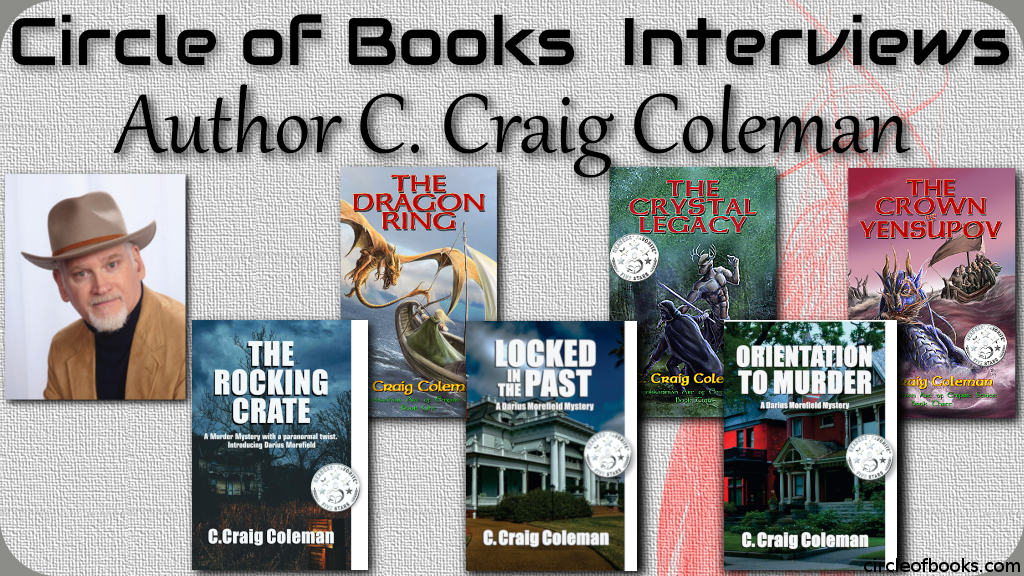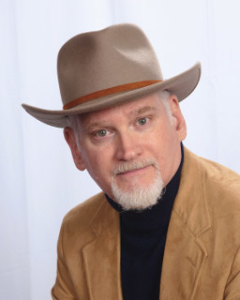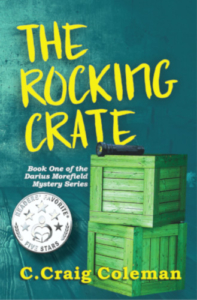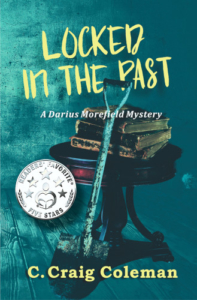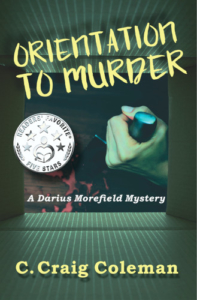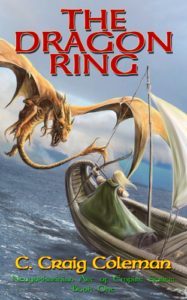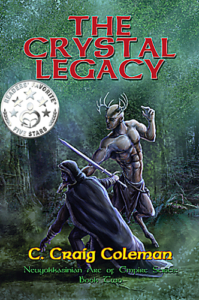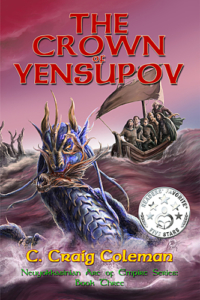Interview – C. Craig Coleman
Darius Morefield Mystery Series
The Neuyokkasinian Arc of Empire Series
– When did you start writing stories/novels, what moved you to start writing?
When my IT and Mfg. operations management careers ended abruptly with a company buyout, my industry had been imploding, I had just turned fifty, and the local economy was in freefall. I had to think ‘outside the box.’ As a kid, I had a friend who taught literature at a university. She had once chuckled at some of my imaginative stores. She said, “You should write some of this down.” Many decades later, that seed germinated. I had lost my investments in the tech crash of 2000/2001. Writing a book would be unique, low cost (I thought) option. It could be sold outside the local area, and it wasn’t something that would be produced cheaper overseas. I’d had an idea for an epic fantasy way down deep in the back of my mind, but never gave it much thought. I never expected to write anything more than emails and business reports. I dug that idea out, dusted it off, drew a map, added magical names I’d devised over a lifetime, and set out on an adventure the scope of which I’d not envisioned. It began as a money making project. It quickly paid off not in money but in a free burst of creativity that was by far the greatest reward.
– In what genres do you write? Do you plan writing in other genres?
I’ve always loved mythology and epic fantasy since I was a child. There was never any other genre I’d want to write in initially. The Neuyokkasinian Arc of Empire series was an obsession from the start. It took fifteen years to write, rewrite, edit, and publish. I learned to write backward as I wrote what would turn out to be the first three books of the series before finding out from other writers and writer groups all the things I did wrong. I rewrote the epic over and over for a dozen years to correct the flaws.
Four years later, I decided I wanted to try writing a murder mystery, but not a grim story. I wanted to leave my readers feeling good at the end of the books. So I dived in and wrote frantically having finally learned to write well from the start. Now I love writing mysteries as much as writing epic fantasy, but they are totally different. I may well stick my toe in other genres in the future. I’ve come to love writing novels.
– Tell us about your novels. Why should everyone buy them?
My works are stories of life. They have the entertainment factors, of course, but they have depth in personal challenges and character development to engage the readers. I hope my books make readers think and relate the stores to his and her personal issues. I hope followers buy and read my works to live a new life and connect deeply with the characters adding fresh dimensions to their own lives.
– What is your all-time favorite novel? What makes it special?
My three favorite novels are Gone with the Wind, Hawaii, and the Lord of the Rings trilogy.
– Gone with the Wind is just the best story, has the best characterization, has action, drama at every turn, depicts a rich life and society at its zenith, and engulfs the reader in it all.
– Hawaii is massive in scope also. It shows life through time not just at one moment. The reader lives different lives but from one location and feels like they belong in that location. I love that about Michener novels. The writing is rich in description and character development.
The Lord of the Rings trilogy with The Hobbit is the original epic fantasy that established the genre with its timeless tale. It immerses the reader in a totally new world conjured from northern European mythology that was absolutely real to the people of the middle ages. It is the free range of imagination, yet it is written with such care that is has seamless credibility, a quality critical for the genre and missing in so many other works.
– Tell us a bit about your writing process.
I had no formal creative writing training. I just wanted to write down my story. I love maps and began the process by creating a map on my dining room table one day. I’ve ‘created’ names since I was a small child. Those magical names, waiting for decades, flowed onto the map on their own.
I had envisioned a trilogy. I knew roughly the beginning and the end. The actual beginning took some experimenting. Once the story got started, I released of my imagination. That took over and I wrote feverishly, myself along for the ride. I had different colored index cards for elements and kept character names in front of me to ensure I kept the POV consistent through the scenes. When introducing a new character, I wrote down all his particulars on a reference sheet to ensure each remained consistent through the story. Elements and characters appeared from nowhere and life experiences as if for audition calls. Places, experiences, challenges, just flooded in. The books took on lives of their own.
Having learned my craft with the fantasy series, the mysteries were more structured. I wanted to show the evolution of a sleuth to murder investigator. The challenges were three: 1) Engage the reader with suspense and anticipation. 2) Create characters that grab and entangle the readers. 3) Be sure the reader doesn’t figure the mystery out before the end.
I started by creating the three primary characters, recorded their characteristics and personalities being sure there was contrast and conflict, and established the times and locations. Then the books spilled out on the word processor.
When I’d hit a stumbling block, I’d take a brisk two mile walk. When I got back, it was all resolved and I sat down to write again.
– What author would you love to have dinner with?
Margaret Mitchell, she lived what she wrote. That quiet lady knew more about real life than most of us ever will. She was so passionate about the tumultuous times she shared with us. The smallest details of Southern society bloomed on her pages like ornaments on a Christmas tree. Sadly, I suspect most readers never know the depth of what she wrote. Gone with the Wind is the greatest depiction of a culture I have ever read.
– Tell us about your hobbies and passions other than writing.
My hobbies and passions are endless. The more I peek into elements of life, the more fascinated I become. I am most zealous about animals and plants in general. I’ve had tropical fish since the age of six. I grow and hybridize, African violets, streptocarpus, daylilies, hostas, adeniums, cacti, orchids, etc. I’ve registered my introductions and won awards for my orchids from the American Orchid Society. I have loved my dogs, cats, parrots, canaries, koi, turkeys, on and on. I love ancient and European history and classical music such as Bach’s Brandenburg Concerto #2, Beethoven, Mozart, and Brahms. Yet, I love disco, too. I sculpted stoneware dragons. I read extensively histories, fantasy, and now mystery novels. This list goes on and on.
– We have many followers who would like to start writing a book or are already writing their first novel, any advice for these brave people?
Take a creative writing class before you start. Go to book signings and other gatherings to hear what writers say about their experiences. Buy a copy of the Writers Market and read/scan over that to see what is involved in getting a book to market. It’s a far more arduous task than most imagine.
Then decide on your story base. Will it appeal to lots of people? Sketch out the framework and pass it by a few associates but not your close friends. If you wrote technical manual, friends would be ‘bedazzled.’ Set up your writing space and tools. Keep a sheet to record your characters characteristics and begin writing. When you have a couple of chapters, edit them completely! Then let a few people read them to get some responses. Listen and learn, but don’t argue. Join a writers group and have the members critique those chapters. Get the bugs out before you go any further. Editors and agents are going to want to change much of your story later. Be sure you get the basic kinks out before you go further into the tale.
– How often do you write, daily, every other day or?
When I’m writing, I’m writing at every opportunity. For me, it’s like those characters can’t wait to get out on paper. Mr. Muse directs me, no kidding. I meet him on the walks and he tells me what is going on next, lol. Most writers will tell you to write every day. That keeps you ‘in the groove’ and hones your skills. Writing is very much a craft.
– Do you keep a notebook with ideas for your novels? If so do you carry the notebook with you so you won’t forget any ideas?
I don’t keep a notebook, but I do write down ideas from time to time on scraps of paper.
– How important is research when writing your books?
A good novel will have correct historical elements. So far, I’ve not had to do a lot of research as I have written from life experiences and studies through my life. For example, I studied mythology since youth and my travels gave me important details to create places in the books. In the mysteries, they are set in 1970, when I was in college so their surroundings are from real life. Where I needed specifics, such as the right truck model for 1970, I researched Wikipedia for confirmation.
– What are you reading at the moment?
I’m reading a novel on Hawaii at the moment, but it’s bogged down by way too many difficult names. This was for diversion. I’ll be back reading a bestselling murder mystery next to see what makes it a best seller. So far, I’ve found it’s the marketing not the novel that gets it to the NYT list. After that, I’ll read a backlist of epic fantasy and SciFi novels.
Note: I didn’t read any fantasy novels while writing my own series. I didn’t want another work to influence mine. From the responses I’ve gotten, my books are a fresh take on famously classical elements. I’m quite happy with that.
– Certainly, you have had some interesting episodes as an author, fans related or others, share one of them with us.
So what if you don’t have a Masters of Fine Arts! That’s about the mechanics of writing. Writing is about the marriage of imagination and the craft of writing. The first you must have and set free. The second, you can learn. It takes a while to establish your ‘voice.’ Don’t give up. Critiques will run full circle. “No two people read the same book.” We all filter what we read through our own life experiences. At first, critiques will harp on all the things you did wrong, jerk you all over the place. You must toughen up and learn to glean the valid points from the ‘personal preferences.’ Eventually, you will stop letting everyone else manipulate you to write what they would write. Then you will write what is natural and reflects you. Then you will discover your voice.
Don’t do any kind of swaps. It makes you beholden to the other party. If their side of the equation isn’t up to your standards it puts you in an awkward situation.
– A final message for our circleofbooks.com readers.
READ! Read whatever you like, but read. Read a highly reviewed book in a new genre to discover if you might in fact like that genre. The more you read, the more you will stimulate your imagination. It will help you enhance your skills and broaden your vision and experiences. One of the favorite quotes I have read goes, ‘You can live one life or you can read and live many lives!’
Thank you C. Craig Coleman. We at circleofbooks.com wish you much success!
Click here to visit the author’s page here on circleofbooks.com
Tweet
